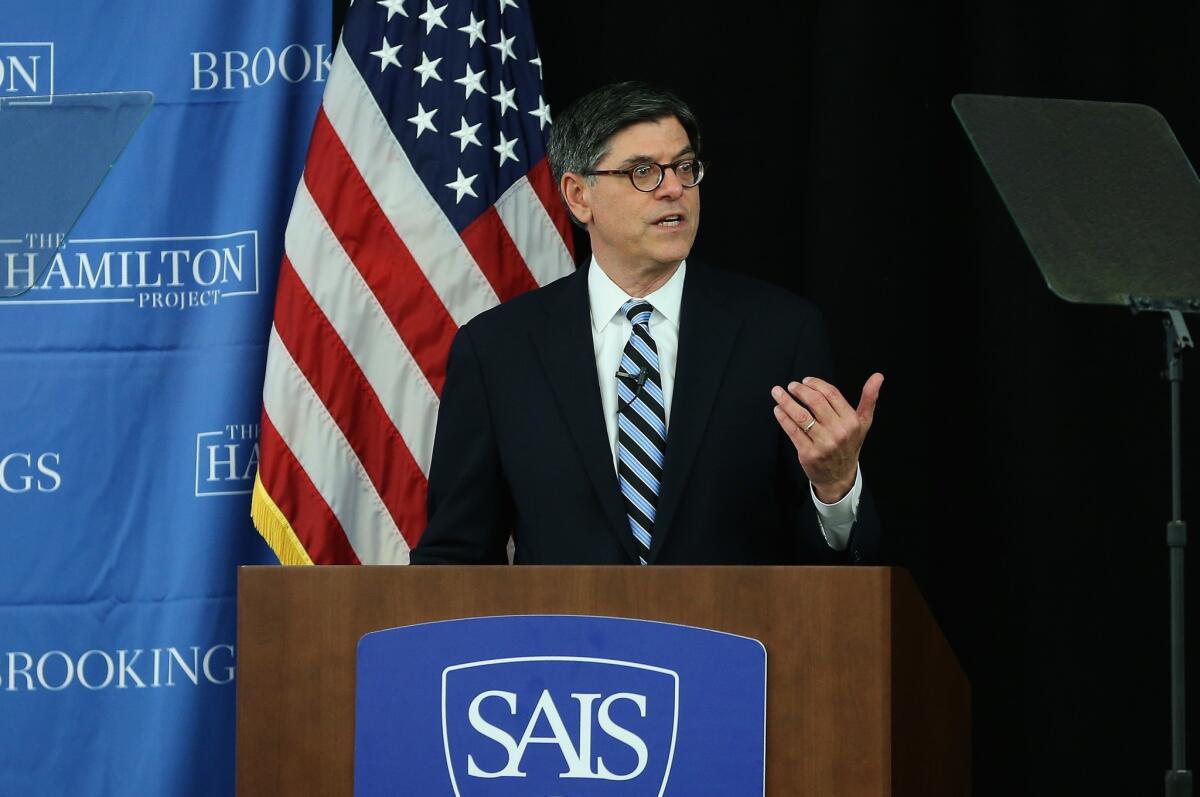U.S. moves to curb tax bill reducing inversions

- Share via
Reporting from WASHINGTON — With Congress unable to agree on legislation to stem a surge of offshore corporate moves, the Obama administration took executive action Monday to discourage companies from shifting their headquarters abroad to reduce their U.S. tax bills.
The steps — technical revisions to the tax code — will reduce the allure of so-called tax inversions, Treasury Secretary Jacob J. Lew said in announcing the long-awaited move.
“This action will significantly diminish the ability of inverted companies to escape U.S. taxation,” Lew said. “For some companies considering deals, today’s action will mean that inversions no longer make economic sense.”
The moves are only part of the solution, Lew and Obama said. Congress must now broadly overhaul corporate taxes or target legislation to curtail a maneuver that has become increasingly popular among corporations seeking to avoid the high U.S. tax rate.
“We’ve recently seen a few large corporations announce plans to exploit this loophole, undercutting businesses that act responsibly and leaving the middle class to pay the bill, and I’m glad that Secretary Lew is exploring additional actions to help reverse this trend,” Obama said.
The U.S. has the highest corporate tax rate — 35% — of any major developed economy. As other countries have lowered their rates in recent years to lure business, some U.S. corporations have looked to foreign acquisitions to reduce their tax liabilities.
It’s unclear whether the changes, which a senior Treasury official said dealt with the problem only around the edges, would scuttle any of the recent high-profile inversion deals.
Some analysts have questioned whether the limited action would dissuade companies from reincorporating abroad.
In recent months, Illinois pharmaceutical giant AbbVie Inc., Miami company Burger King Worldwide Inc. and several other firms have agreed to buy smaller companies in foreign countries with much lower tax rates and move their headquarters. By reincorporating as foreign companies, they will be able to shelter billions of dollars from U.S. taxes.
The Obama administration has questioned the companies’ “economic patriotism,” saying they relocated simply to avoid paying their fair share of U.S. taxes for roads, scientific research and other publicly funded expenses.
Democrats and some Republicans have criticized inversions. But Republicans want a broad overhaul of the corporate tax code, an effort that has stalled in Congress.
The Obama administration had threatened to take executive action if Congress did not act. After lawmakers left town Friday for a recess that will extend past the November elections, Lew wasted little time rolling out the executive actions.
The Treasury Department said it would eliminate some corporate techniques, such as so-called hopscotch loans that companies with headquarters abroad use “to gain tax-free access” to some earnings.
The department also will strengthen a limitation on inversions that requires a U.S. company that reincorporates overseas to be more than 20% foreign-owned.
To meet the requirement, some U.S. companies reduce their size through maneuvers such as issuing large dividends to shareholders before acquiring a smaller foreign firm. The Treasury Department now will prohibit such maneuvers.
The actions would apply only to companies that invert after Monday.
Leaders of Reforming America’s Taxes Equitably, a coalition of 32 major U.S. companies and organizations pushing for corporate tax reform, said the moves by the department don’t address the real problem of “America’s uncompetitive and unfair tax code.”
“Instead of focusing on more Band-Aid solutions that add further complexities to the tax code, our leaders should instead work in a bipartisan manner to achieve overall reform that lowers the rate to an internationally competitive level and creates a fairer, simpler tax system,” said the group’s co-chairs, Elaine Kamarck and James P. Pinkerton.
The Obama administration has asked Congress to pass legislation with even tougher restrictions, including a requirement that foreign firms have at least 50% foreign ownership for tax purposes.
The administration and some top congressional Democrats want those legislative restrictions to be retroactive to the spring, when lawmakers first started talking about cracking down on inversions.
Sen. Ron Wyden (D-Ore.), chairman of the tax-writing Senate Finance Committee, cheered the administration’s executive steps. But he said “only Congress had the full range of tools to address both the immediate problem and ensure U.S. businesses continue to be competitive in the global economy.”
“As more companies use inversions as a strategy to avoid paying U.S. taxes, it is clear that Congress must act to protect remaining U.S. businesses, workers and families from having to pay higher taxes,” Wyden said.
Sen. Orrin G. Hatch (R-Utah), the committee’s top Republican, has said inversions need to be addressed. But he opposes retroactive action and believes the issue should be part of an overhaul that reduces the high U.S. corporate tax rate.
“America’s tax system is broken to the point that it’s putting our nation at a competitive disadvantage around the globe,” Hatch said Monday. “In the end, any solution that permanently addresses inversions must be legislated by Congress.”
Twitter: @jimpuzzanghera
More to Read
Inside the business of entertainment
The Wide Shot brings you news, analysis and insights on everything from streaming wars to production — and what it all means for the future.
You may occasionally receive promotional content from the Los Angeles Times.











